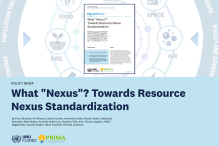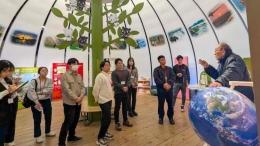On 13 September 2022 at 16:00 (UTC +2), the UNU World Institute for Development Economics Research (UNU-WIDER) will host the event "Tax Effort Revisited: How Much Tax Can Low-income Countries Expect to Collect?". This will be the first event in the new Think WIDER Webinar Series — New Perspectives on Domestic Revenue Mobilization.
Tax revenue mobilization is important in attaining the Sustainable Development Goals (SDGs) and countering debt vulnerability. Low- and middle-income countries, however, are constrained in their ability to raise taxes. While they could collect more in tax revenues, it is unknown how much can be collected. Tax effort studies have attempted to answer this question, with recent estimates suggesting that many developing countries are collecting less than their tax potential.
Tax effort studies are usually commissioned by aid donors, and the findings can play a significant policy role in terms of advice and technical assistance provided to recipient countries. This webinar will be an exchange of ideas between the authors of a recent WIDER Working Paper, Tax Effort Revisited: New Estimates from the Government Revenue Dataset, as well as guests from the donor and research communities.
This one-hour event will be chaired by Abrams M.E. Tagem, who leads the Government Revenue Dataset project at UNU-WIDER. Speakers include Kyle McNabb, Michael Danquah (UNU-WIDER), Angela Bellmooney, and Joyce Chuma. The event will conclude with a Q&A session where the audience is invited to ask questions.
Register here for the webinar.
For related information and event updates, visit the UNU-WIDER website.
About the speakers
Abrams M.E. Tagem is a Research Associate with UNU-WIDER. He is an empirical development economist, focusing on fiscal capacity and development aid and on the application of (panel) time-series methods.
Angela Bellmooney is a Tax Policy Hub Manager at UK’s Foreign, Commonwealth & Development Office (FCDO).
Kyle McNabb is a development economist whose research interests focus on fiscal policy in low- and middle-income countries. He is currently a Research Associate for the Development and Public Finance programme and a Tax Policy Analyst for the TAXDEV programme at Overseas Development Institute.
Michael Danquah is a development economist and a Research Fellow at UNU-WIDER. His research interest is in economic development in sub-Saharan Africa, primarily focussing on issues such as inclusive growth, informality, and productivity growth among others.
Joyce Chuma is the founder and Director of Salima Research Consultancy. Prior to establishing Salima, Joyce was a lecturer in the Department of Economics for 12 years at the Midlands State University, Zimbabwe. Her main research interests are in tax policy and tax administration in developing countries.



